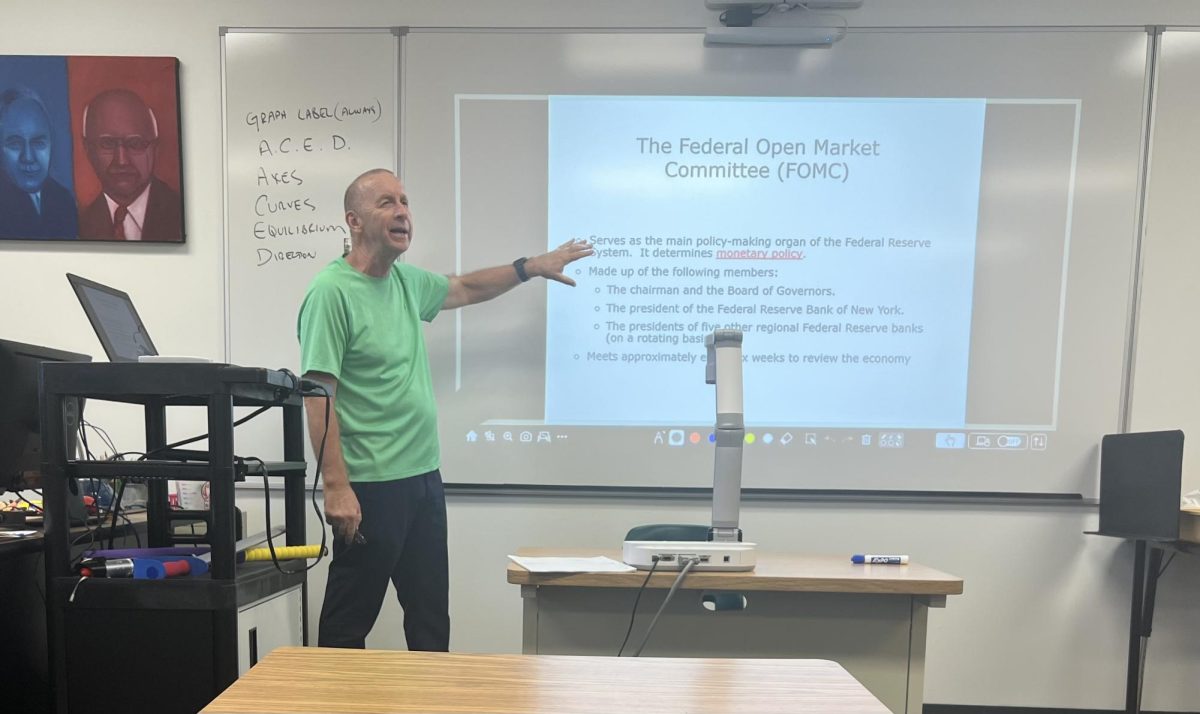A truck idles at a port halfway across the world, and suddenly, milk costs more at the local grocery store. A single handshake in a boardroom sends shockwaves through stock markets, shifting the value of currencies overnight. Beneath the surface of everyday life, a hidden network of decisions and events silently drives the world’s economy, linking distant countries and unsuspecting consumers in a web of cause and effect.
AP Macroeconomics offers seniors an in-depth exploration of these economic principles, focusing on the forces that shape national and global economies. Covering topics like inflation, unemployment, fiscal policy and international trade, the course challenges students with college-level material and encourages them to apply their knowledge to real-world scenarios.
With over two decades of business experience, AP Macroeconomics teacher Mr. Rick Humes brings a deep understanding of economics to his classroom. Humes, who has been teaching at Carroll for the past three years, is passionate about helping students grasp complex economic concepts and their real-world applications.
“We cover everything from basic principles like supply and demand to more complex topics such as monetary policy and trade,” Humes said. “My goal is to ensure students understand how their decisions impact the economy.”
With the evolving nature of the economy, the AP Macroeconomics coursework is dynamic and designed to stay up-to-date with current events.
“Every day there’s something new happening,” Humes said. “I want students to not only understand the textbook concepts but also be able to apply those concepts and understand the world around them.”
Senior Noemie Houtekie-N’Da, a student currently enrolled in the course, describes it as both challenging and enlightening.
“I didn’t expect to learn about all the different angles that are needed to understand the relationship between the economy and the lives of the individual,” Houtekie-N’Da said. “It’s fascinating to see how everything is connected.
She also stressed the importance of staying engaged in class to grasp the material fully.
“You can’t just skim through the content,” Houtekie-N’Da said. “It’s important to ask questions and participate in discussions, especially when the concepts get complicated.”
Another AP Macroeconomics student, senior Anishka Chokshi, notes the importance of staying organized to keep up with the material.
“There are many new concepts we need to understand, which can be difficult at first,” Chokshi said. “Mr. Humes does a great job at preparing us, but reviewing the material and getting the homework done the day of class is helpful.”
As the course progresses, students begin preparing for the AP exam, which tests their ability to apply the concepts they’ve learned.
“This class and the exam go beyond just remembering definitions,” Humes said. “It’s about understanding how economic systems work.”
His advice to his current and future students is to stay curious and organized.
“The more engaged you are, the more you’ll get out of it,” Humes said. “Not just in terms of the exam, but also in understanding the world around you.”
For students considering taking AP Macroeconomics, the course offers a mix of academic rigor and real-world relevance, helping students think about the global economy and their role within it.
“If you’re interested in how the world works and how decisions affect everything, this class is for you,” Houtekie-N’Da said.













